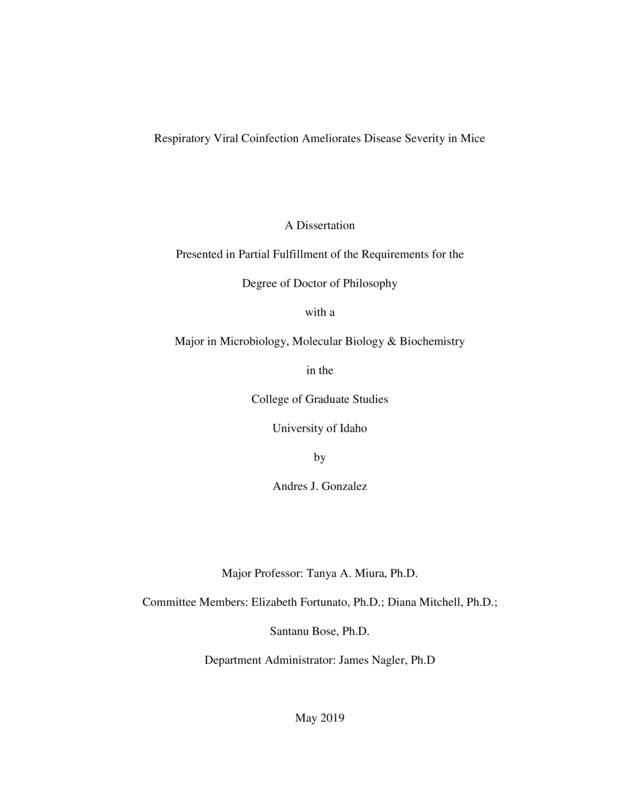Respiratory Viral Coinfection Ameliorates Disease Severity in Mice
Gonzalez, Andres Jose. (2019-05). Respiratory Viral Coinfection Ameliorates Disease Severity in Mice. Theses and Dissertations Collection, University of Idaho Library Digital Collections. https://www.lib.uidaho.edu/digital/etd/items/gonzalez_idaho_0089e_11636.html
- Title:
- Respiratory Viral Coinfection Ameliorates Disease Severity in Mice
- Author:
- Gonzalez, Andres Jose
- Date:
- 2019-05
- Program:
- Biology
- Subject Category:
- Microbiology
- Abstract:
-
Improvements to viral diagnostic techniques led to increased detection of multiple respiratory viral pathogens from single samples. These co-detections of multiple viruses are known as viral coinfections. Viral coinfections are reported to lessen, increase, or not affect disease severity compared to individual virus infections. The literature is unclear as to what infection parameters or immune responses drive the disease severity aberrations. Clinical data cannot determine the timing of virus infections concerning each virus or the initial severity of each infection. We developed a mouse model of respiratory viral coinfection that allows us to control infection parameters. We can control for the timing, order, severity, and pairing of each virus. Using this model, we have determined that a less pathogenic virus can attenuate the disease severity of a more pathogenic virus. We used a minor group rhinovirus (RV) to attenuate the disease severity of influenza A virus (IAV), pneumonia virus of mice (PVM), and mouse hepatitis virus (MHV) when viruses were inoculated two days apart. We then determined that coinfection-mediated disease attenuation was not unique to RV, but MHV could also attenuate IAV and PVM disease severity. Further research found coinfection-mediated disease attenuation was dependent upon timing between virus infections and the severity of infections. Coinfection induced an early interferon response in mice, but the level of induction was dependent upon the specific viral pairing. Early type I interferon signaling was blocked in coinfected mice by intranasal administration of an antibody specific to the type I interferon receptor. We determined type I interferon was not a required mechanism for coinfection-mediated disease attenuation during RV and PVM coinfection. We then depleted neutrophils by intraperitoneal injection of an antibody specific to Ly6G high neutrophils. Depletion of neutrophils early during coinfection did not affect coinfection-mediated disease attenuation during coinfection with RV and PR8. Further experiments targeting other components of the innate immune system will be required to elucidate the critical mechanisms of respiratory viral coinfection-mediated disease attenuation.
- Description:
- doctoral, Ph.D., Biology -- University of Idaho - College of Graduate Studies, 2019-05
- Major Professor:
- Miura, Tanya A
- Committee:
- Fortunato, Elizabeth; Mitchell, Diana; Bose, Santanu
- Defense Date:
- 2019-05
- Identifier:
- Gonzalez_idaho_0089E_11636
- Type:
- Text
- Format Original:
- Format:
- application/pdf
- Rights:
- In Copyright - Educational Use Permitted. For more information, please contact University of Idaho Library Special Collections and Archives Department at libspec@uidaho.edu.
- Standardized Rights:
- http://rightsstatements.org/vocab/InC-EDU/1.0/

